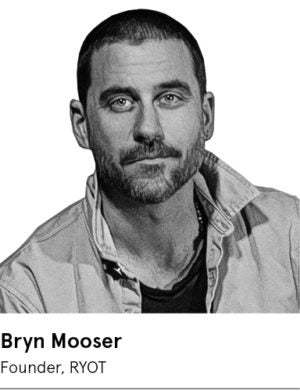 Since Bryn Mooser co-founded immersive media company RYOT in 2012, the studio has been pushing the boundaries of what can be produced with VR and AR. The idea of the company goes back to the time he spent in Haiti’s capital city Port-au-Prince, after the devastating earthquake of 2010.
Since Bryn Mooser co-founded immersive media company RYOT in 2012, the studio has been pushing the boundaries of what can be produced with VR and AR. The idea of the company goes back to the time he spent in Haiti’s capital city Port-au-Prince, after the devastating earthquake of 2010.
“I moved down to build a high school and when I was there I met my co-founder David Darg. We were both film-makers who had an interest in humanitarian work and we started making films there,” explains Mr Mooser.
It was very clear to him that the global view of Haiti was cynical and many people felt like there was nothing they could do about global problems, but as technology advanced and connected people around the world through social media, there was no longer any excuse to do nothing.
“RYOT started as a news website with a function where every story had an action, so when you read about something in the world, you could actually do something about it, whether it be to sign a petition, volunteer or donate,” says Mr Mooser. From creating the world’s first all-VR film in a war zone with Welcome to Aleppo to the first in natural disaster VR with The Nepal Project, RYOT’s work is now defining what is possible in a fully VR world.
RYOT is focused on building what the future of content and media will look like in a 5G world
“My mission has always been how do we use technology to try and make the world a better place? We began to experiment with new technologies to tell stories and we found our perfect medium with VR,” explains Mr Mooser.
RYOT quickly made a name for itself as the go-to VR firm for news and documentaries, and developed VR content for high-profile companies, including The Associated Press, HuffPost and The New York Times. Today RYOT is focused on building what the future of content and media will look like in a 5G world.
“What will a movie or TV show look like in 5G and how will you watch content in the back of your driverless car when it’s enabled with 5G? We believe 5G is ushering in the fourth industrial revolution; it’s like nothing that has come before and it will create major disruptions in all industries, from mobility to health to technology,” says Mr Mooser.
Super-fast 5G internet will not only offer mobile users more stable connections and low latency, but this game-changing innovation is set to unlock exciting new types of experiences. “We are focused on how to help build and enable the products of the future, so the consumers of tomorrow can’t live without 5G,” says Mr Mooser.
Transitioning to a more AR-friendly digital environment may not be the leap many consumers expect it to be. For example, although few users will be fully aware of the underlying AR technology, every time face filters are used in popular social media apps, they will be becoming more comfortable with AR applications.
Businesses are building new products and services that are going to enable consumers and businesses alike to do things they never dreamed possible via 5G. “It’s not enough to just have lower latency and better download speeds. The 5G solutions that leverage those benefits could be amazing. But is that enough to get somebody to switch phones? I don’t know,” says Mr Mooser.
Ideas that were once based in science fiction are on course to become increasingly feasible thanks to the power of 5G. Driverless cars will be able to communicate with each other driving down the road and the near real-time rendering of items in AR can be wholly achieved.
“We’re at the tipping point right now and we’re looking at how to bring forward-thinking companies on to the bleeding edge of technology, and use that technology to tell stories in a new way and capture a new audience,” says Mr Mooser.
If companies want to remain at the top of their market, it’s no longer possible for them to gloss over AR/VR technologies and 5G-enabled services, as the impact of these solutions will mean every industry is about to experience a dramatic disruption. A fully 5G-enabled world will fundamentally change the entertainment experience for viewers, in part thanks to the ability of advanced computing in the cloud.
Mr Mooser believes leaders will approach 5G in one of two ways. “Either they’re going to take control of the tremendous opportunity to lead into the future or get left behind, which if you look at historical trends, is what happens to many,” he says.
In an age of disruptive startups that have the power to transform entire industries through the use of new technologies, it’s now up to businesses to make sure they are innovating fast with the right partners.
Mr Mooser concludes: “From a business perspective, there has never been a more exciting time.”
For further information please visit www.ryot.org

